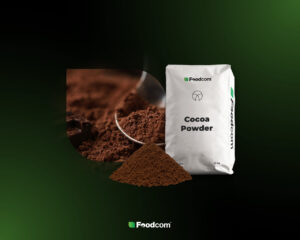- The European market for potato flakes is under pressure due to increasing import competition and the limited availability of organic options, and the expected weak potato harvest is impacting prices.
- Wheat gluten prices are fluctuating globally, with declines in Chicago and increases in Europe, driven by high demand from bakeries in particular.
- Cocoa powder is struggling with limited availability and rising prices, while Argentinian maize production is significantly restricted due to a plague of locusts.
Welcome to our plant-based newsletter!
This week we see notable movements in several key products — potato flakes, wheat gluten and cocoa powder — all of which are affected by unique challenges and market dynamics. In addition, recent developments in agricultural commodity futures and crop production are drawing attention, with significant implications for global food supply chains. We want to take a closer look at these market changes and understand their potential impact on the industry and beyond.
Let’s take a look at what else is happening on the market!
Products of the Week
Potato Flakes
The market for Potato Flakes is experiencing increasing price competition from imports of products from countries outside the European Union, which is putting pressure on local producers and affecting costs and availability. In addition, the demand for organic flakes, which are only available in limited quantities, is increasing, which could lead to higher prices. At the same time, the coming potato harvest is expected to be weaker than usual, which also threatens the stability of prices and the availability of the raw materials needed for flakes.
Vital Wheat Gluten
Vital Wheat Gluten prices are showing dynamic changes in different regions of the world. In Chicago we are seeing price reductions, while in Europe the price trend continues to rise. These differences may influence the purchasing decisions of producers and distributors. In addition, demand for wheat gluten remains high, which is evident in the significant recovery in the market – the number of buyers has increased, especially among bakeries. Wheat gluten, which consists of 80% protein, is readily used by manufacturers of bread and other bakery products to increase the protein content of their products.
Cocoa Powder
The Cocoa Powder market is facing difficulties due to limited availability and fluctuating prices. Although the price increase has slowed somewhat, the trend is still upwards. Many producers are concerned that production could become unprofitable if prices continue to rise. There is a risk that the products will lose their appeal to consumers and disappear from shopping baskets. To overcome these challenges, the industry needs to develop effective strategies to control costs and remain competitive.
NEWS
Decline in november soybean futures on the chicago board of trade
November soybean futures fell for the seventh consecutive session on the Chicago Board of Trade, the longest streak since March 2023. Prices closed at $11.50-1/2 a bushel, the lowest since April 18, as seeding is not yet complete and 20% of U.S. soybean crops are not yet planted. The USDA is expected to release its first assessment of the health status of US soybeans next Monday, which could influence future market developments.
Argentina faces significant corn crop loss due to locusts
In Argentina’s core region, farmers have planted around 564,000 hectares more maize than expected, almost 2 million hectares in total. However, the locust infestation has significantly affected the expected yield. Despite the potential for a record harvest, estimated at 17 million tons, the locust infestation reduced the final yield to 9.1 tons per hectare, resulting in a total production of 14.5 million tons for the 2023/24 maize season. This is a significant loss that mainly affects late crops in the region.

![The heat’s on: Cocoa Powder prices & crop crises you can’t miss! [58th Foodcom PLANT-BASED Newsletter] The heat’s on: Cocoa Powder prices & crop crises you can’t miss! [58th Foodcom PLANT-BASED Newsletter]](https://foodcom.pl/wp-content/uploads/2024/06/Foodcom_SA_Plant-Based_Newsletter_3-1520x760.jpg)


![Plant-Based Market: navigating potato costs & vegan demand [67th Edition of the PLANT-BASED Newsletter] Plant-Based Market: navigating potato costs & vegan demand [67th Edition of the PLANT-BASED Newsletter]](https://foodcom.pl/wp-content/uploads/2023/08/Foodcom_Newsletter_Plant-Based-600x300.jpg)



